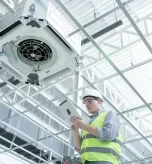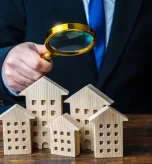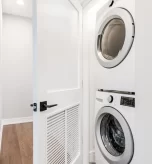Buying a condo is an exciting step, whether you’re a first-time homeowner or looking to downsize. But before you seal the deal, a condo home inspection is a must.
Like traditional homes, condos need a thorough check to ensure you’re making a sound investment. This blog highlights the key things to check during a condo inspection. This way, you can enter your new home with confidence.
What Is a Condo Home?
Before we dive into inspections, let’s clarify what is a condo home. A condominium, or condo, is a private residential unit within a larger building or complex. Owners usually share common areas like lobbies, gyms, pools, and hallways. They still own their interior unit.
Condos are popular in cities. They often have benefits like less maintenance, extra amenities, and better security. But just like with standalone homes, inspections are essential.
Read More: 10 Things to Look for in a Drywall Inspection
Is a Home Inspection Necessary for a Condo?
Absolutely yes. Even though exterior maintenance and shared structures are generally handled by a body corporate (or HOA), your unit may have hidden issues. Plus, shared elements like roofing and plumbing can still affect your condo unit.
A detailed home inspection for condo properties helps buyers spot both unit-specific and building-wide problems.
What Does a Home Inspection Consist Of?
Whether it’s a house or a condo, many buyers ask, What does a home inspection consist of? Here’s a quick breakdown:
- Interior structure: Walls, ceilings, and flooring conditions
- Plumbing systems: Leaks, water pressure, drainage
- Electrical systems: Outlets, breakers, wiring safety
- HVAC systems: Heating and cooling functionality
- Appliances: If included in the sale
- Smoke alarms and safety features: Working detectors, fire sprinklers
- Windows and doors: Proper sealing and function
When inspecting a condo, the main focus is on the inside of the unit. Inspectors may also point out problems in the walls, ceilings, or shared plumbing.
Top Things to Look for During a Condo Home Inspection
Let’s break down the things to look for during a home inspection so you’re well-prepared:
1. Electrical Panel and Wiring
Make sure the electrical system is updated, safe, and compliant with local codes. Faulty wiring can be dangerous and costly to repair.
2. Plumbing Issues
Check for leaks under sinks, slow drains, or water damage on ceilings and walls. Plumbing issues could indicate shared problems with upper or lower units.
3. HVAC System
Does the unit have its HVAC? Ensure it functions properly, and someone has serviced it. Central systems in older buildings may affect individual units.
4. Appliances
If your condo comes with a washer, dryer, oven, or fridge, ensure all are working properly. Replacing these can be expensive.
5. Signs of Water Damage or Mold
Water stains, warped flooring, or musty smells may indicate water intrusion or mold, major red flags.
6. Windows, Doors & Insulation
Proper sealing keeps energy bills low and comfort high. Check for air drafts, broken locks, and cracks.
7. Flooring and Ceilings
Cracks, stains, or sagging may point to structural concerns. Always note these and have them reviewed further if necessary.
Shared Spaces: What You Should Know?
Inspectors mainly look at the unit itself. However, they may also notice clear issues in shared areas. This includes places like stairwells, lobbies, or roofs. They will do this if these problems could affect your unit.
If you have concerns, consider requesting the condo inspection list or the building’s maintenance history. Things like:
- Roof replacement dates
- Elevator maintenance
- Fire alarm systems
- Plumbing upgrades
These insights give you a fuller picture of the property’s health.
Condo Inspection Checklist: What Should Inspectors Cover?
Having a condo inspection checklist can be handy. Here’s what a solid inspection typically includes:
- Interior walls, ceilings, and floors
- HVAC system and thermostat
- Electrical panel, outlets, switches
- Plumbing and hot water system
- Doors and windows
- Kitchen appliances
- Bathroom fixtures and fans
- Laundry connections (if inside unit)
If you’re unsure, always ask your inspector for a detailed report.
Condo Inspection: Do You Need Furniture?
Many buyers wonder, “Condo inspection, do you need furniture?” The short answer is: no.
Whether you’re inspecting a furnished or empty unit, a professional inspector will still examine all accessible areas. An unfurnished condo may be easier to inspect for hidden damage.
That said, if you’re going through a condo inspection with furniture, ensure large items aren’t blocking access to:
· Electrical panels
· HVAC units
· Under-sink plumbing
If necessary, ask the seller to move items before inspection.
Read More: Thermal Imaging in Home Inspections: Benefits & Limitations
What Should Buyers Do During a Home Inspection?
One of the most common questions is what buyers should do during a home inspection? Here’s how to make the most of it:
- Attend the inspection if possible
- Ask questions about what the inspector finds
- Take notes and photos of issues that concern you
- Focus on big-ticket items like plumbing, HVAC, and electrical
- Use the report to negotiate repairs or pricing with the seller
Being present shows that you’re engaged and can help you better understand your future home.
Riverside Buyers: Why Choose Professional Condo Inspection Services?
If you live in Riverside and plan to buy a condo, you should work with a local expert like Key Property Inspection Group. Our team provides comprehensive home inspections for condos tailored to Riverside’s property standards.
Our Benefits Include:
- Clear, same-day digital reports
- Qualified and insured inspectors
- Checklists customized to your condo type
- Pre-purchase advice to help you make informed decisions
Buying a condo is a big step. Our goal is to make sure it’s a smart one.
FAQs
1. Do condos need the same home inspection as houses?
Not exactly. Condo inspections typically focus on the unit’s interior because the body corporate maintains the exterior and structural elements. However, internal systems like plumbing, HVAC, and electrical are just as important to inspect.
2. Can I skip the condo inspection if the building is new?
It’s not recommended. Even new constructions can have defects. A condo inspection helps identify issues early, giving you peace of mind before moving in.
3. Will the inspector check common areas?
Generally, inspectors focus on the unit itself. However, the report may show visible problems in common areas. These include leaking ceilings, poor maintenance, or unsafe stairs.
4. What should I do if major issues are found?
Discuss the findings with your real estate agent. You may negotiate repairs, ask for credits, or reconsider the purchase depending on the severity of the issues.
5. How long does a condo inspection take?
Most condo inspections last between 1.5 and 2.5 hours. The size, condition, and systems being checked determine the time.
Final Thoughts
Condo living offers comfort, community, and convenience. But don’t skip the home inspection on condo properties just because they’re part of a building. Understanding electrical systems and possible water damage helps you know what to expect. This knowledge lets you buy with confidence.
A proper condo inspection protects your investment, helps uncover hidden issues, and gives you negotiation leverage. Whether you’re purchasing your first condo or your next one, always choose trusted condo inspection services.
Need help with your upcoming inspection? Contact the Key Property Inspection Group – Riverside’s trusted inspection professionals.





